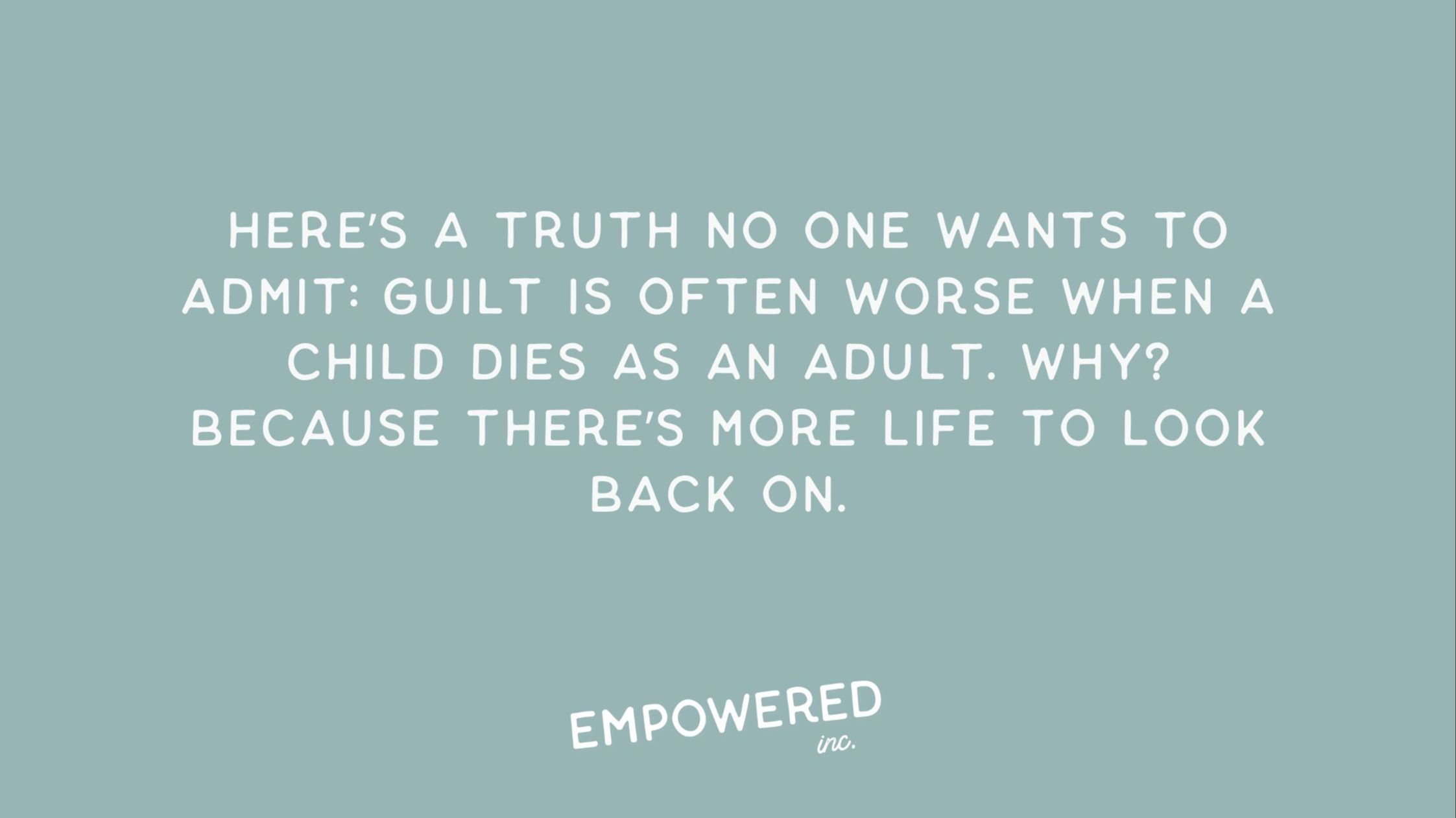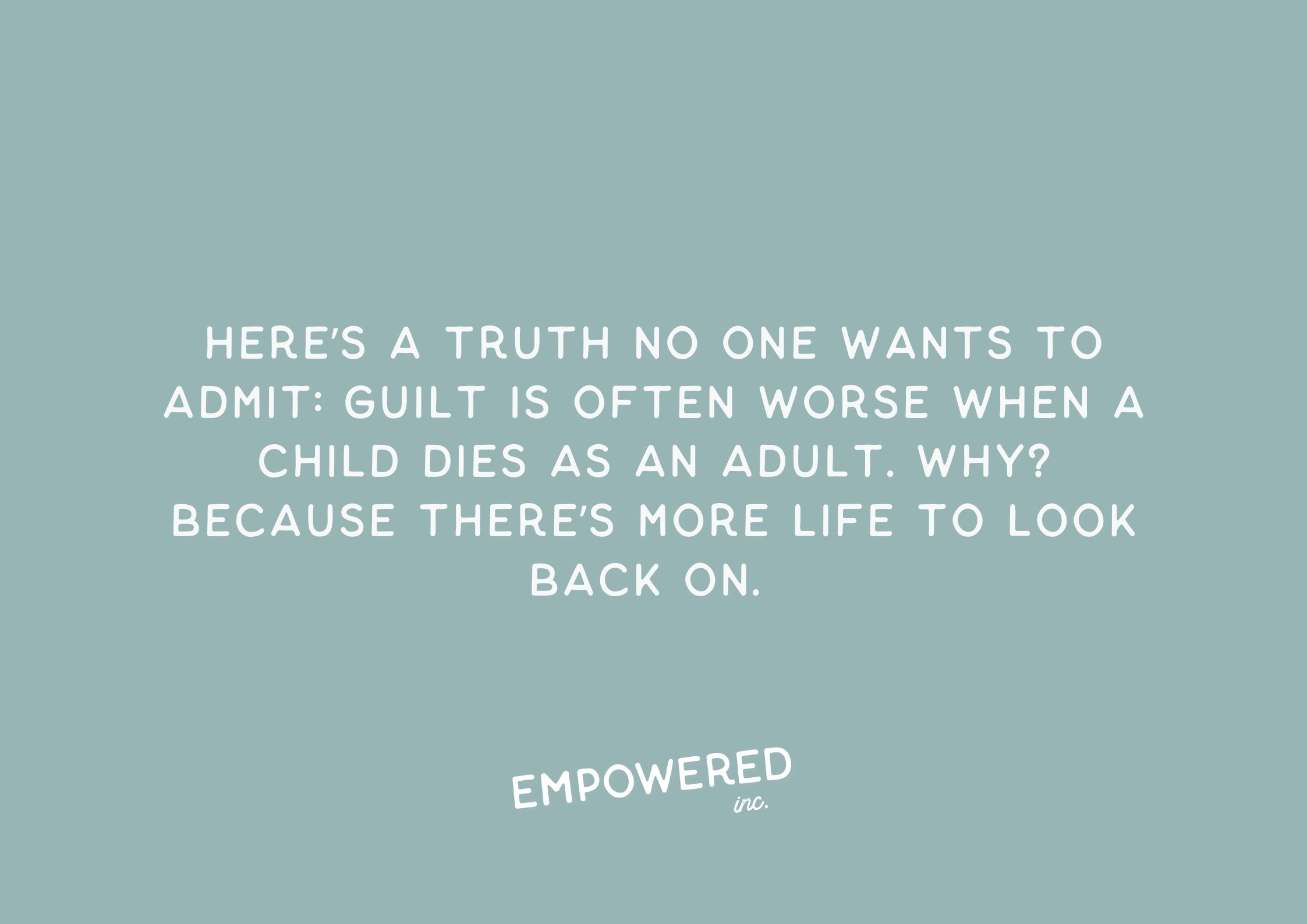How to Process the Loss of an Adult Child: Grieving the Death No One Talks About
May 28, 2025
What to do when your adult child has died.
No parent plans for this. We tell ourselves there’s a natural order to life: we go first, they carry on.
When you become a parent, you don’t imagine burying your child—especially not after they've built a life of their own. You imagine watching them grow, guiding them through adulthood, and leaving behind a legacy for them to carry.
And when that future vanishes? The world doesn’t know what to do with you.
Grieving the death of an adult child is one of the most ignored and misunderstood experiences— and, too often, even within our own profession. If you’re here, you already know: this isn’t just grief. It’s devastation. And pretending otherwise is harmful.
It’s time we talked about it.
What is Disenfranchised Grief?
After the death of an adult child, many parents find themselves facing a unique form of grief called “discounted grief” or “disenfranchised grief.” Disenfranchised grief is described as when your grieving doesn’t fit in with your larger society’s attitude about dealing with death and loss. The lack of support you get during your grieving process can prolong emotional pain (WebMd). This happens when the depth of your sorrow is minimized by others— not out of malice, but often because of misunderstanding. There are many different events that may lead to disenfranchised grief including adult child loss (Wikipedia Disenfranchised Grief).
Society is uncomfortable with grief. And when it comes to the loss of an adult child, that discomfort turns into dismissal. People will say things like “At least they weren’t a child anymore,” “you had so many good years with them,” or “it was their time.” As if age makes it easier. As if there’s an expiration date on a parent’s love.
Whether a child was 25, 45, or 60, they were still a child. When others overlook or downplay a person's grief, it can leave them feeling isolated and misunderstood. This is what’s known as disenfranchised grief — and it’s damaging. It silences parents, isolates them, and subtly pressures them to “move on” faster than they’re capable of.
And here’s the problem: even trained professionals do it.
Without an understanding of grief and how it presents, professionals can put themselves at risk of unintentionally minimizing the grief of a parent who’s lost an adult child. Understanding and recognizing disenfranchised grief for what it is can help the mourning process so that the appropriate support needed is available.
Overcoming Guilt and Loss After the Death of an Adult Child
It’s common for parents to carry a crushing weight of guilt after losing an adult child. Some might replay old conversations, question decisions made decades ago, or feel as though they should have somehow prevented the unpreventable.
Here’s a truth no one wants to admit: guilt is often worse when a child dies as an adult. Why? Because there’s more life to look back on. More decisions to second-guess. More moments to replay, wondering what could’ve been done differently.
This kind of guilt, though deeply human, can become a heavy companion in grief. It’s important to remember:
Each person did the best they could with what they knew at the time. They were not meant to control every outcome of their life. Their love for them was, and is, enough.
This is where skilled grief support matters. This is where mentorship, education, and community become non-negotiable. These types of support can offer space to untangle these complex emotions in a supportive environment.
How to Face the Future After the Loss of an Adult Child
After the loss of an adult child, the future can feel like an unrecognizable place. People often question their identity and wonder who they are without them, and what life is supposed to look like now.
The future once imagined is gone— and a new one that honors both loss and survival is being rebuilt.
Some ideas to rebuild the future after the loss of an adult child are:
Creating rituals to honor memories on birthdays, anniversaries, and ordinary days.
Exploring new connections and experiences while carrying loss.
Giving permission to feel joy again, without guilt.
Grief changes the person. But it can hold meaning, even amidst loss.
Grief Support for Parents Who Lost an Adult Child
One of the most healing things someone who is grieving can do is surround themselves with others who truly understand. This kind of loss can be lonely, especially if friends or family struggle to know what to say.
Finding grief groups for parents of adult children who can relate and understand is immensely helpful. Or finding therapists who specialize in traumatic grief, and mentors who have stood in loss and the depths of grief.
If you’re a therapeutic professional and you don’t know how to hold this kind of grief— it’s time to learn. At Empowered Inc., we equip professionals and those navigating loss, with tools to have these conversations with skill, presence, and heart—not just theory.
Below are resources to help professionals and caregivers supporting people who have experienced loss, in establishing a strong grief foundation to help heal.
Empowered Inc. Resources for Professionals and Caregivers
Community Support
- Community support where you can connect with people at different points in their grief journeys.
Visit the Empowered Heart Collective and Empowered Connections. The Empowered Heart Collective is a space for compassionate professionals, educators, and advocates committed to guiding and empowering others. Empowered Connections is a Grief Support Community and supportive space created specifically for those who are navigating loss.
Grief Support Specialist Training
- Counselling or grief specialists trained to support complex, life-altering loss.
Our Empowered Grief Support Specialist Training is a credentialed and evidence-informed course that prepares professionals to provide competent, compassionate support for individuals navigating complex and life-altering grief experiences.
Online Resources
- Empowered Blog: Online resource to understand the impact of loss and how to navigate healing. The Empowered Blog is a space for insight, guidance, and inspiration—offering expert knowledge, real stories, and practical tools Explore topics on healing, resilience, and professional development, and discover new ways to support yourself and others.
- Empowered Courses: Courses designed to help professionals and caregivers gain tools to offer holistic healing and sustainable transformation. All courses are approved by NBCC. Grief Support Specialist and Meditation Teacher Training approved by NAADAC and APA.
Closing Thoughts
Grieving the death of an adult child is one of the deepest, most complicated sorrows a person can face. It touches every part of one’s identity and challenges everything about the order of life.
At Empowered Inc., we believe in creating space for these layered, difficult conversations. If you’re a professional, or caregiver supporting others through loss— or if you’re navigating this grief yourself— know that compassionate, evidence-informed resources are available to you.
Subscribe to our newsletter to stay connected with future courses and resources for navigating loss no one wants to talk about. We’re building a different kind of grief education here. One that is healing and lasting.
Empowering Updates
Subscribe to get the BEST Empowered updates delivered to your inbox:
We don't like spam either. You can unsubscribe at any time.




